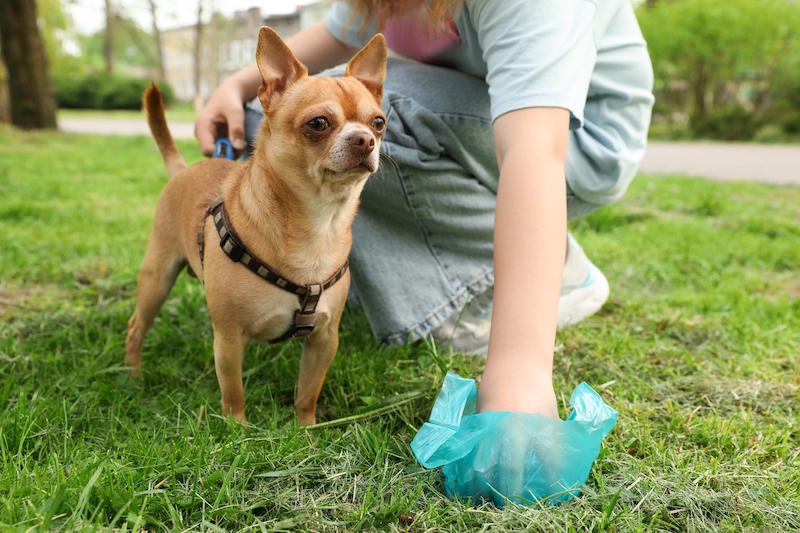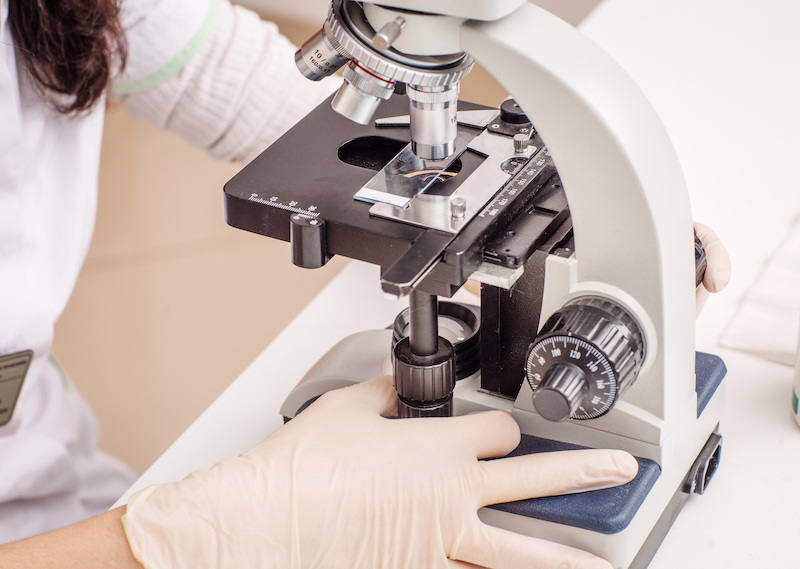- What is a dog fecal test?
- What is the purpose of routine dog fecal testing?
- How can I get my vet the freshest stool sample for my pup’s fecal test?
- What do vets look for during a dog fecal test?
- How much does a dog fecal test cost?
- How often does my dog need to take a fecal test?
- Does pet insurance cover the cost of my dog’s fecal testing?
- What happens after a dog fecal test?
Dog fecal testing is an important diagnostic tool that involves using a sample of your dog’s poop to detect parasites and other health issues. In 2024, the cost of a dog fecal test ranges from about $40 to $75 for a standard exam, while more in-depth testing could come with a price tag of more than $100.
As a pet owner, having your dog’s poop routinely examined by a vet is a critical way to help ensure your pup’s overall health and well-being.
Let’s explore the specifics of this crucial part of pet parenthood.
What is a dog fecal test?
A dog fecal test—often referred to as a fecal exam or internal parasite test—is a type of diagnostic test used by veterinarians to identify potential intestinal parasites in your pet’s poop.
There are several types of fecal tests for dogs, including:
- Fecal flotation
- Fecal smear
- Antigen testing
- Centrifugation
What is the purpose of routine dog fecal testing?
Having a vet examine your dog’s poop on a regular basis is a preventive measure that helps catch these pesky parasites early, when the infestation is still manageable and less likely to cause your pup severe health problems.
By finding and treating these common parasites fast, you’re helping your dog maintain better overall health, and you can prevent potential zoonotic transmission—meaning the movement of parasites from animals to humans. Some of the most common zoonotic parasites found in dogs are hookworms and roundworms.
How can I get my vet the freshest stool sample for my pup’s fecal test?

Your vet needs a fresh sample of your dog’s poop to get accurate results during testing. To collect the freshest dog stool sample, follow these tips (we hope you’re not eating breakfast right now):
- Portion size: Collect a sample about the size of two sugar cubes. A little more is fine, but you probably won’t need the entire bowel movement.
- Nothing extra: Try to collect a clean sample that doesn’t include things like dirt, grass, gravel, or kitty litter. Contaminants can interfere with test results.
- Handle with care: Use a clean plastic bag or disposable glove to pick up the feces. If you opt for a baggie, turn the bag inside out, scoop up the feces, then turn the bag back and tie it off.
- Store properly: If you can’t get the sample to your vet immediately, seal it in a designated container and store it in a separated area of the fridge to avoid cross-contamination with food. Do not put it in the freezer, as it can affect the sample and test results.
- Sanitize: Always wash your hands thoroughly after handling your dog’s feces, even when using bags or gloves, to prevent potential spread of parasites.
- Deliver quickly: Collect the sample as close to your vet appointment as possible, ideally within 24 hours. Dog poop degrades over time, which can impact test accuracy.
What do vets look for during a dog fecal test?
During a dog fecal test, the vet is primarily looking for signs of intestinal parasites in your dog’s feces that could pose significant risks to your pup’s health—or cause issues for the rest of your human family members and fur fam—if left untreated.
Somes of the main parasites vets look for include:
- Roundworms: Often ingested by dogs from the environment, these parasites can cause vomiting, diarrhea, and weight loss.
- Hookworms: These tiny parasites attach to a dog’s intestinal wall, causing anemia and weight loss. They also have the potential to transfer from animals to humans.
- Whipworms: Can lead to bloody diarrhea and weight loss in dogs. It can be difficult to completely eliminate whipworms once they’re established in your pup’s intestines.
- Tapeworms: These pesky worms can make their move when your pup consumes fleas or raw meat, causing symptoms from mild discomfort to intestinal blockage.
- Giardia: Can cause a diarrhea-specific illness known as “giardiasis”, which leads to weight loss and malnutrition in dogs. It’s resistant to common dewormers, and can transfer from animals to humans.
- Coccidia: Can cause diarrhea and dehydration, especially in young or immunocompromised dogs.
Your vet might also recommend an extended panel that takes an even closer—and more precise—look at your pet’s stool. These panels can differentiate between regular and drug-resistant hookworms, for example, or indicate if a strain of giardia has a human health risk or not. Some of these tests can also detect salmonella.
How much does a dog fecal test cost?
In 2024, the average cost of a standard dog fecal test ranges from $40 to $75. The price can vary depending on several factors such as where you live, the specific veterinary clinic, and the type of test performed.
An extended dog fecal panel is a more comprehensive test, but will likely be more expensive—around $100 or more.
Keep in mind the exam cost usually doesn’t include the price of any medication your pup might need following the results of the testing.
How often does my dog need to take a fecal test?

Pet parents should ideally follow the guidelines set by the Companion Animal Parasite Council, which recommends:
- At least four times during your puppy’s first year of life, because of their higher susceptibility to parasites
- At a minimum every six months after your dog’s first birthday, depending on their health and lifestyle (two fecal tests per year)
Keep in mind: If you take your pooch to a boarding facility or day care, some facilities might require you to show proof of a recent negative fecal test.
Does pet insurance cover the cost of my dog’s fecal testing?
Some pet insurance plans cover certain preventive care, which may include fecal tests.
With one of Lemonade’s other preventative care packages, you’ll be eligible for one annual fecal or internal parasite test—for up to $35 per year, in addition to things like one wellness exam, vaccinations, heartworm testing, and so much more.
Or if you’re the proud parent of a fresh pup, you could include our Puppy/Kitten Preventative Care Package on your policy, we could help cover the costs of two fecal or internal parasite tests—for up to $70 per year.
Keep in mind that specific reimbursements of claims will depend on the coverages, co-insurance, and deductible that you chose when signing up.
What happens after a dog fecal test?
Once your dog’s fecal exam is complete, your vet will report the results and explain the next steps.
For example, if parasites or their eggs are detected, your vet will prescribe your dog treatment right away, which commonly includes deworming medications that will likely need to be given either orally or topically.
After your pup completes their treatment, your vet might request another fecal sample to make sure your dog is in the clear. This is especially important in severe infestations, or cases that involve extra stubborn parasites.
Your vet may recommend extra preventative measures, such as more frequent fecal testing, specific hygiene practices, and parasite prevention products to maintain your pet’s health and prevent future infestations.
Before we go…
Investing in pet insurance early in your pup’s life can help provide your fur fam with extensive coverage—from preventative testing, to unforeseen accidents and illnesses as they grow up into adult dogs.
Did you know that at Lemonade Pet you can cover your pooch with dog insurance from the time they’re two months old?
Click below to get your quote started today.
A few quick words, because we <3 our lawyers: This post is general in nature, and any statement in it doesn’t alter the terms, conditions, exclusions, or limitations of policies issued by Lemonade, which differ according to your state of residence. You’re encouraged to discuss your specific circumstances with your own professional advisors. The purpose of this post is merely to provide you with info and insights you can use to make such discussions more productive! Naturally, all comments by, or references to, third parties represent their own views, and Lemonade assumes no responsibility for them. Coverage and discounts may not be available in all states.




